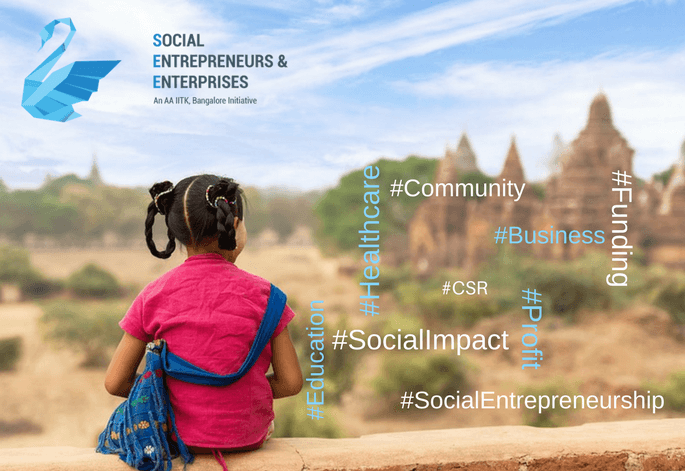Recently, I got the opportunity to participate in Bangalore CSR Roundtable hosted by Brillio & Equal Innovation in partnership with India CSR on May 3rd 2017.
Some key points from this event I want to share with you all. Before that let me put some light on what is Social Entrepreneurs and Enterprises (SEE) and how this is related to this event.
Social Entrepreneurs and Enterprises (SEE)
It is an initiative of IITK AA, organised and now carried forward in association with IITKGP AA and supported by PAN IIT, IIMA, PAN IIM and ACB.
SEE started as an event and the first SEE focused primarily on awareness and scaling models for Successful Social enterprises. It had speakers and participants from all sectors. During the first edition of SEE one message came out very clearly that there is an increasing gap between social enterprises (not-for-profit or for-profit) and CSR funds/investors.
Second edition of SEE focused on Healthcare and Education. This edition also looked at setting up the framework so that Alumni from IIT’s can effectively engage and contribute to the critical sector.
It brought various social entrepreneurs, philanthropists, thinkers and enthusiasts under one roof. The event allowed great interactive sessions where on one hand the participants got inspired by conviction-led work by speakers and on the other hand various corporate discussed the challenges and their insights. Mr. Paritosh Segal, Co-Founder Sahyog Foundation, led the curation for the event.
After intensive research on challenges faced by social enterprises and impact investors, a framework was launched during the event by Mr. Pradeep Bhargava, President, IITK AA & IITK AA BLR. Core objectives of the framework is to identify sectors that may be relevant and that may produce visible outcome, list the key impact areas and the key measures, understand and share the feasibility and impact data, build the stakeholders connect as part of SEE ecosystem which comprises financial institutions, CSR, Angel investors, VC’s, mentors, incubation with IIT and partners and entrepreneurs in the impact space.
We discussed on various aspects of CSR funding and pain-points of corporates as well as social enterprises. It was very enthralling for me to know that all these common problems faced by both entities can be resolved through SEE platform.
I would like to highlight a few key challenges and would like to emphasise on the role of SEE framework in resolving these issues:
Lack of trust between corporates and social enterprise world:
It was evident that corporates are willing to release CSR funds for social enterprises, but whom to trust for measurable impact has become a challenge for them. I strongly believe that SEE body can recognise and validate shortlisted social enterprises who genuinely have good model and thus help them sustain and scale. Corporates can have concurrence and decide where to invest.
Impact assessment of social enterprises by corporates:
Second evident challenge for all corporates is to measure the impact created by the social enterprise. One of the solution which was proposed is to have a set template by corporates where social enterprise can fill their outcomes. But the problem with such template is that there are several different enterprises all cannot be measured with the same template. SEE framework can play a crucial role in impact assessment by providing customised template.
Industry standard reporting by social enterprises:
Another point which was brought into discussion was reporting structure and the quality of report. Corporates feel that there is a need for social enterprises to improve on reporting but the fact that social enterprises many a times are not trained to publish their reports in a professional way. It becomes really challenging for corporates to go through the document and validate the report. We at SEE aim to create a pool of identified experts in different domains with social sector background as mentors. These mentors shall bring guidance to social enterprises and shall organize hands-on training sessions on impact measurement, impact assessment and impact reporting. This shall have positive outcome by reducing frustrations for both corporates and social enterprises.
Identifying the key focus area of corporates by social enterprises:
One of the biggest challenge which almost all social enterprises face invariably is to find out the corporates who have same focus area as their own. I recently faced a problem in identifying a CSR who invest in healthcare area. There is no common platform where corporates list their focus areas and social enterprises list their work.
Participation as SEE evangelist
SEE platform has planned to create a database on SEE website for all participants. This is going to ease the very first step of corporate and social enterprise to find the best match.
Social Enterprises
All these and many more benefits can be obtained by signing up for SEE Framework. SEE as a part of Alumni framework is not chargeable. Please register to be part of the SEE ecosystem and all benefits.
Investment community and CSR support from Corporates
They can leverage the curated social enterprises. Investors and CSR teams may share the success stories, the impact areas of their interest and the measures they use in identifying the right enterprise to support.
Accelerators, Incubators, and Mentors ( AIM)
AIM participants work together with the SEE team to ensure high probability of success for the individual enterprise but also contribute to ensure a higher percentage of successful SE. Commercial engagements are also possible after the initial success is registered.
Look forward to you all being part of SEE
Knowledge thats worth delivered in your inbox





